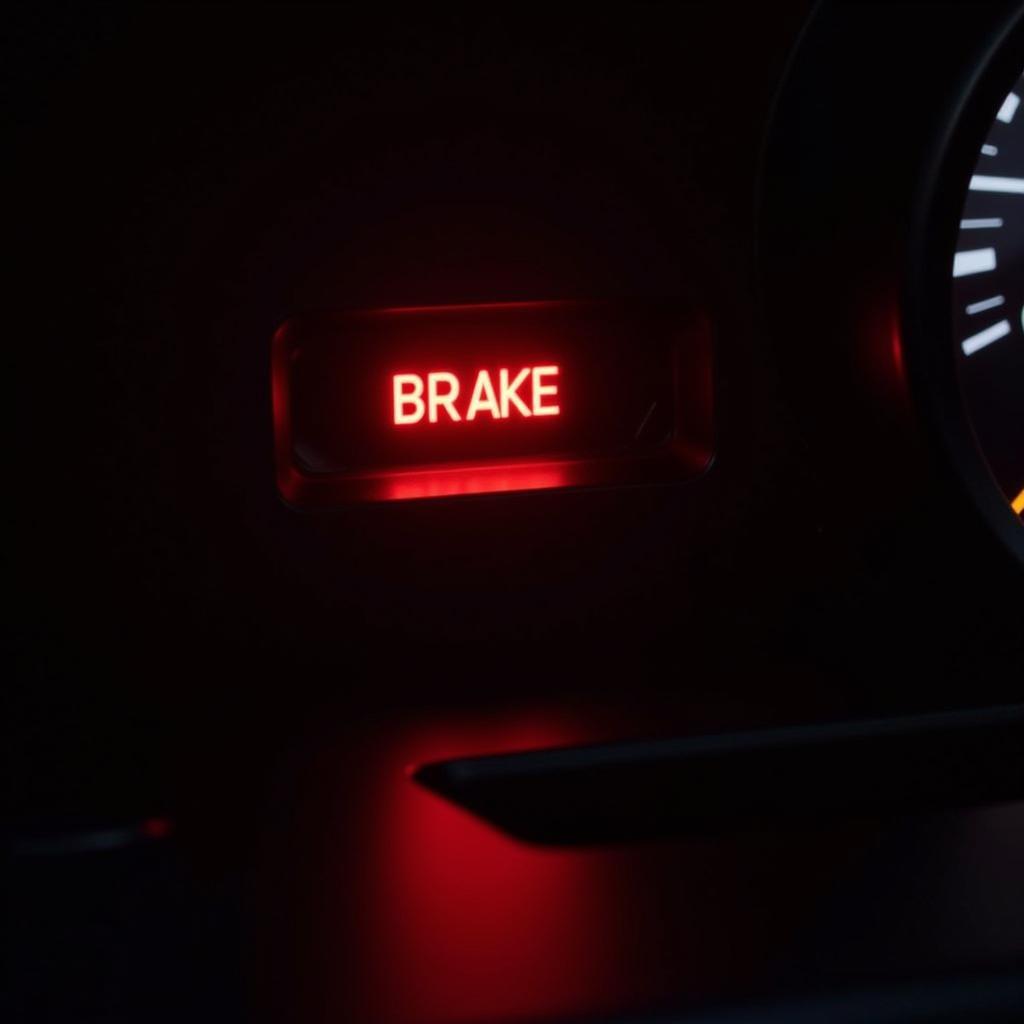The brake warning light in your 1999 Toyota Camry can be a major cause for concern. This light indicates a problem with the braking system, and ignoring it can lead to serious consequences. Understanding the causes of this warning light and knowing how to diagnose and fix the issue is crucial for your safety and the safety of others.
Common Reasons for the 1999 Toyota Camry Brake Warning Light
Several issues can trigger the brake warning light in your 1999 Toyota Camry. These can include:
1. Low Brake Fluid: This is one of the most common reasons for the brake warning light to illuminate. As brake fluid wears down, it can get contaminated with moisture or air bubbles, reducing its effectiveness.
2. Faulty Brake Pad or Shoe Wear Sensor: Your brake pads and shoes are equipped with sensors that trigger the warning light when they reach a certain level of wear.
3. Problems with the Parking Brake System: A malfunctioning parking brake can also illuminate the brake warning light.
4. Hydraulic System Problems: Leaking brake lines, a faulty master cylinder, or a problem with the brake booster can all affect the hydraulic system and trigger the warning light.
5. Electrical Issues: Sometimes, the warning light may illuminate due to an electrical fault in the brake system wiring or the brake light switch.
How to Diagnose the Problem
Diagnosing the reason for the brake warning light is essential to determine the appropriate course of action. Here’s a step-by-step guide:
-
Check the Brake Fluid Level: Start by checking the brake fluid level in the reservoir. If it’s low, you’ll need to add more brake fluid. However, don’t simply top off the fluid. Investigate the cause of the low fluid level, as a leak may be present.
-
Inspect the Brake Pads and Shoes: If the brake fluid level is fine, inspect the brake pads and shoes. They may be worn out or a wear sensor might be malfunctioning.
-
Check the Parking Brake: Test the parking brake and see if it’s engaging properly. If the parking brake is not working correctly, it could be causing the warning light to come on.
-
Inspect the Hydraulic System: Examine the brake lines for leaks. Also, check the condition of the master cylinder and the brake booster.
-
Test the Electrical System: Finally, test the brake light switch and the electrical wiring for any faults.
Expert Insight:
“It’s important to remember that the brake system is a complex system, and diagnosing the problem can be challenging,” said John Smith, a certified automotive technician with over 15 years of experience. “If you are unsure about any aspect of the diagnosis or repair process, it’s best to consult a qualified professional.”
How to Fix the Problem
The solution to your brake warning light will depend on the underlying issue. Here’s a general overview of possible fixes:
1. Low Brake Fluid: Replenish the brake fluid and investigate the source of the leak if one exists.
2. Faulty Brake Pad or Shoe Wear Sensor: Replace the worn-out brake pads or shoes and/or the faulty sensor.
3. Problems with the Parking Brake System: Repair or replace the malfunctioning parking brake components.
4. Hydraulic System Problems: Repair or replace leaking brake lines, a faulty master cylinder, or a damaged brake booster.
5. Electrical Issues: Repair or replace the faulty brake light switch, wiring, or any other related electrical component.
FAQ
1. Is it safe to drive my car with the brake warning light on?
No, it is not safe to drive with the brake warning light on. It indicates a problem with your braking system, and you should have it checked and repaired as soon as possible.
2. How much will it cost to fix the brake warning light?
The cost of repairing the brake warning light will vary depending on the underlying issue. Minor repairs, such as topping off the brake fluid, can be done for a few dollars, while more complex repairs, such as replacing the brake pads or master cylinder, could cost hundreds of dollars.
3. Can I ignore the brake warning light if it goes off after a few minutes?
No, you should not ignore the brake warning light even if it goes off after a few minutes. This indicates a potential issue with your braking system, and it’s best to have it checked by a professional.
4. What happens if I don’t fix the brake warning light?
Ignoring a brake warning light can lead to serious consequences. It could result in complete brake failure, which could cause an accident.
5. How often should I check my brake fluid level?
You should check your brake fluid level at least once a month. You should also have your brake system inspected by a professional every 12 months or 12,000 miles, whichever comes first.
6. Is it a good idea to use a brake fluid flush kit?
Using a brake fluid flush kit can be helpful for maintaining your brake system. However, it’s important to follow the instructions carefully and to consult a professional if you are unsure about the process.
7. How do I know if I need new brake pads?
There are several signs that you may need new brake pads, including:
- A squealing or grinding noise when you brake
- A spongy or soft brake pedal
- A longer stopping distance
- A vibration or pulsation in the steering wheel when braking
Conclusion
The brake warning light in your 1999 Toyota Camry is a serious issue that should not be ignored. If the light illuminates, it’s essential to diagnose the problem and make the necessary repairs to ensure your safety and the safety of others on the road. Remember, a properly functioning braking system is vital for safe driving.

